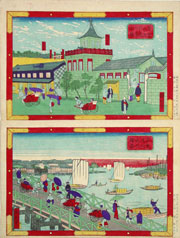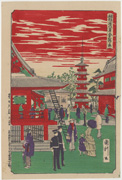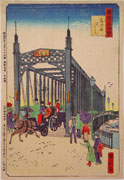Prints in Collection
Famous Places in Tokyo, Kakigara cho Rice Trading Exchange and Etai Bridge, 1881
IHL Cat. #s 474A and 474B
Asakusa Kinryūzan
from the series Famous Places of Tokyo,
1887
IHL Cat. #1562
Biographical Data
Biography
Source: The Hotei Encyclopedia of Japanese Woodblock Prints, Amy Reigle Newland, et. al., Hotei Publishing, 2005, Volume 2, p. 504 and Japan Wikipedia https://ja.wikipedia.org/wiki/%E6%AD%8C%E5%B7%9D%E5%9B%BD%E5%88%A9Utagawa Kunitoshi (1847-1899) 歌川国利 (歌川邦年)
Little is known about this artist's life. It is reported that his real name was Yamamura Kiyosuke 山村清助, which can also be read as Yamamura Seisuke. A pupil of Utagawa Kunisada I (1786–1865) and Utagawa Kunitsugu (1800–1861). Following Kunisada’s death in 1865 he studied under Utagawa Kunisada II (1823-1880). He produced Yokohama-e and kaika-e, depicting horse-drawn streetcars and the like, and meisho-e, illustrating Meiji-era Tokyo. He also made etchings (e.g., Street of Tokyo: Horse-drawn Rail Carriages Crossing the Manseibashi Bridge (Tokyo shigai tetsudo basha Manseibashi tsuko no kei,1882) and View of the Ocean from Atagoyama (Atagoyama sanjo yori kaijo miharashi), from the set Famous Sights of Tokyo (Tokyo meisho, 1890.)
The British Museum reports that he used the gō (artist names) Hara (原); Ichiunsai (一運斎), although I have not seen any signatures of the artist that reflect this.
A Second Rate Artist?
Source: The Maintenance of Tradition in the Face of Contemporary Demands: A Reassessment of Meiji Prints, Oikawa Shigeru, article appearing in The Hotei Encyclopedia of Japanese WoodblockPrints, Amy Reigle Newland, et. al., Hotei Publishing, 2005, Volume 1, p. 262As a consequence of the economies in print production that Meiji era publishers were trying to achieve "was the widespread practice of employing second-rate artists such as Utagawa Kunitoshi, Utagawa Kunihisa (act. c. 1800-20) and Utagawa Fusatane (act. c. late 1850s-70). They could churn out slapdash, easy-to-produce designs, in contrast to masters like Utagawa Sadahide (1807-1873), Kawanabe Kyōsai (1831-1889), Yoshitoshi Tsukioka (1839-1892) and others whose compositions involved intricate line-work.
An Interesting Woodblock Print by the Artist
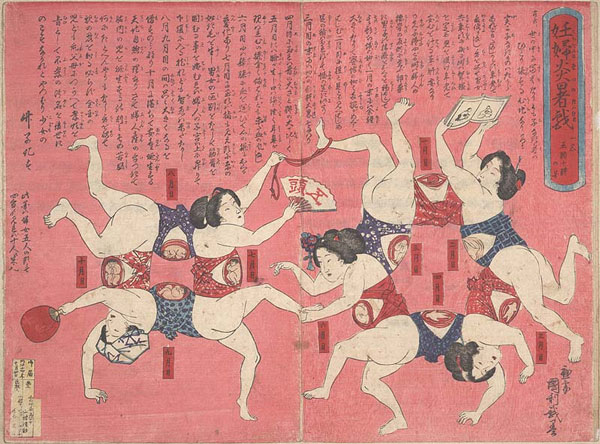
Utagawa Kunitoshi, 1881
Mimochi on’na natsu no tawamure – Gotō juttai no zu
Mimochi on’na natsu no tawamure – Gotō juttai no zu
Pregnant women playing in summer heat - 5 heads with 10 bodies
A Sampling of Signatures and Seals
 國利画 Kunitoshi ga |  楳樹邦年画 Baiju Kunitoshi ga / Baiju and Kunitoshi seals |  梅寿國利暮冩 Baiju Kunitoshi bosha? / Baiju and Kunitoshi seals |  梅寿國利画 Baiju Kunitoshi ga / Toshidama seal |  応需國利 ōju Kunitoshi / Kunitoshi seal |  國利戯墨 Kunitoshi giboku / unread seal |
 くにとしゑ Kunitoshi-e | 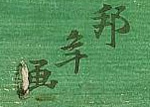 邦年画 Kunitoshi ga |  國利暮 Kunitoshi bu |
 梅寿國剛?ゑ Baiju Kintoshi ?-e |  梅寿國剛筆 Baiju Kunitoshi hitsu |  梅翁國利筆 Baiō Kunitoshi hitsu/ Baiju 楳寿 and Kunitoshi 国剛 seals |  楳樹邦年暮 Baiju Kunitoshi bu? |
last revision:
4/7/2020

